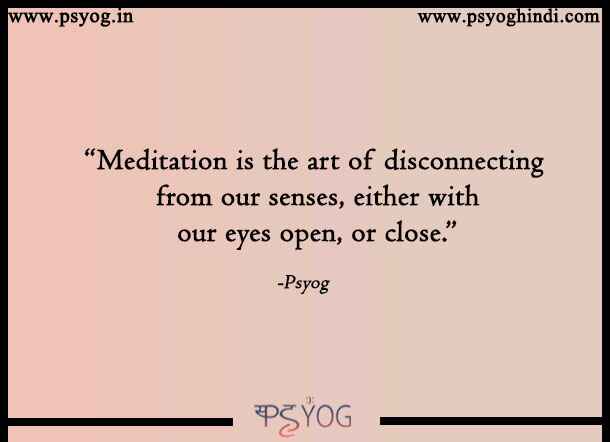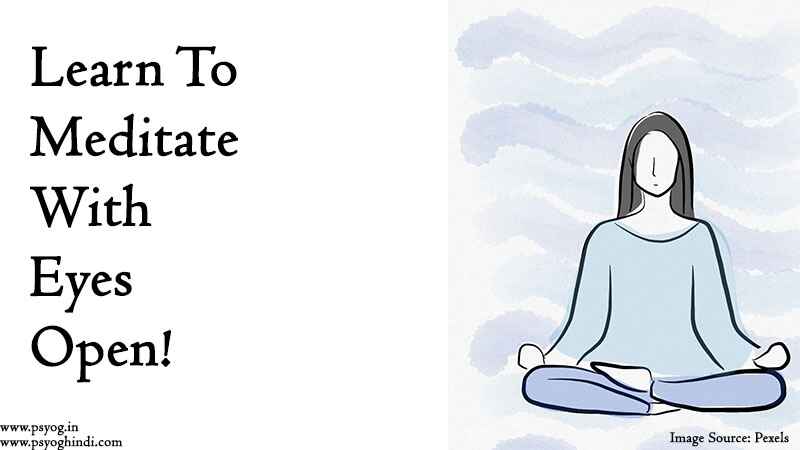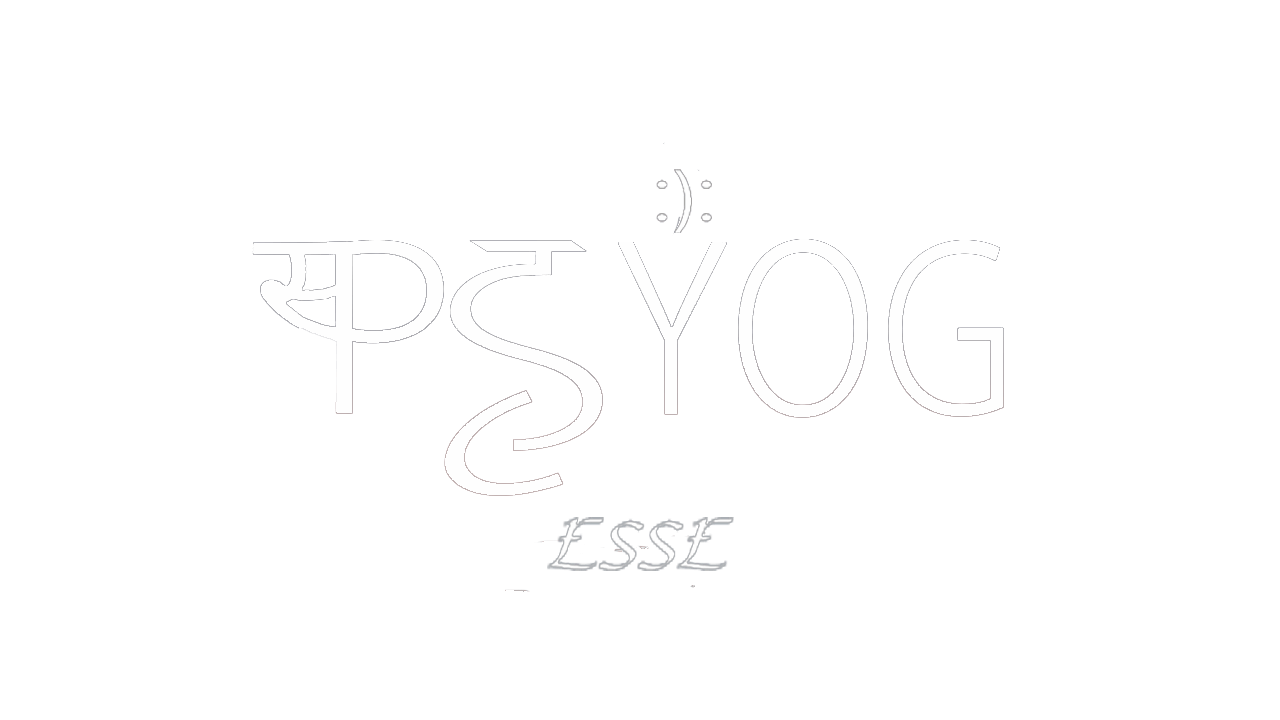How To Meditate With Eyes Open
How To Meditate With Eyes Open
In today’s world of cut throat competition, we find ourselves in a rat race, and often lose our inner calm in the process. Our day starts with our mobile screens, scanning our mails; our daytime is spent on stressful work, and our night again with more screen time. We hardly devote any time to disconnect from the world, and experience that inner calm. It is understandable, that nowadays, we don’t get to close our eyes, and meditate, because we just don’t get the time. Since we remain caught up with worldly duties, people often ask: how to meditate with eyes open. Not just that, but people also ask that does meditation happen with eyes open, or closed. Psyog always answers such questions, hence in this article we will understand that how you can meditate with eyes open, and benefits of meditating with eyes open. To know how to do so, we first need to understand what meditation is.
What it actually is?
Let me guess, for most of us, meditation means sitting with our eyes closed, and focusing hard. But does this work? All we end up doing is: thinking with closed eyes, we keep our worldly thoughts alive within us. That’s not it, our thoughts do not even leave us alone in sleep, hence we end up dreaming about deadlines, emails, problems, and so on. Ever wondered why this happens? Obviously because we do not know what is meditation, or the fundamentals of thought, and its root cause. First let us know what meditation is.
Meditation in actuality, is the art of disconnecting from yourself, and enter a space of “no you.” It is similar to a dreamless sleep like state, wherein we remain thoughtless, and lose track of our individual existence. However, in meditation, we lose track of ourselves, without losing our awareness, which means our awareness has shifted from “me,” and is diverted to a space of “no person.” When we lose our sense of “I,” even our world dissolves, because the world too is experienced within us as thoughts.
In that space, we experience bliss, remain thoughtless, but still can think, but out of choice. We gain expertise in thinking, not compulsively, but consciously. As we mentioned that we are also the source of our world, now let us know that how is that possible? (Read: Individuality Complex)
Going sense-less
Because we are learning that how we can meditate with eyes open, and if meditation happens with eyes open or closed, so we need to understand our sensory perception. We are suggested that we need to close our eyes, disconnect from the world, and focus on our breath, but does that help? No, we keep the world alive within us through our thoughts. But why this happens? To know that, we need understand that how we are the seat of worldly experience.
Do you know that the world is just a thought in our mind, popularly known as “Maya,” or illusion? Yes, remember how the process of seeing works? Light falls on objects, gets repelled, created an inverted image in the retina that our mind processes as thoughts? Yes, we live in a thought world, wherein the world is nothing, but an idea within us. That is why; the world disappears for us in sleep, simply because our awareness has shifted from our senses.
Hence, when we think of meditating, then it is a process of not focusing hard, but simply disconnecting from our senses. This process of going senseless is called “Pratyahara,” in the world of yoga. But how to do so is the question? Well, we would only drop something when we start viewing it as a form of limitation, and not intelligence.

True intelligence
It is true that we remain stuck to our thoughts, or senses, because we believe that thinking is a form of intelligence. However, if that is the case, then you ask yourself: why are people suffering their intelligence? Our thinking is nothing but recycled data that we gather from the world. Hence, it wouldn’t be wrong to say that our thoughts are not even ours, but what the world is showing us. That is why, people have a hard time letting go of suffering, because thinking for them, is the only source of experience.
However, we have failed to experience the intelligence, that nothingness, upon which the drama of worldly thoughts is played. There is an intelligence, which is essentially nothingness, which is the source of the entire physical world. Some call it god, some consciousness, we simply call it life. This intelligence operates independently of our mind and thinking. However, to experience it, we must detach from the source of our thinking: that is our senses, or simply our “I” thought.
This is the subtle art of losing ourselves, wherein our awareness extends beyond our individual selves. But how to do so is the question? (Read: Yoga Quotes)
Being self-less
Do you know that our over obsession with “us,” is the root cause why we cannot stop thinking? Yes, because we remain stuck to the root of thinking, hence we are never able to meditate. Therefore, it can be said that meditation is the art of being self-less, be it with eyes open, or closed. This place of “no person,” is the dimension where magic happens: we experience ourselves as pure awareness.
But the question remains, how we become selfless in a world where we are taught concepts like self-love, respect, and so on? The easiest way is to first realize that it is not “I,” but that all pervading consciousness, which is suffering within us, without which our body is a mere corpse. Yes, isn’t it true that there has to be an intelligence within us, which experiences our sensory information? When we acknowledge the presence of this intelligence, and keep it in our thoughts, we gradually begin to lose ourselves, and eventually merge with it.
How to do it?
There are two ways which can help you meditate with either your eyes open, or closed. One way is to simply remind ourselves often, that it is not “I,” but that consciousness suffering within us, then we naturally bow down. We slowly start becoming devoid of ourselves, and that is what devotion is.
Another better way is not to do it for yourself, but acknowledge that the same consciousness is suffering in others. When we do that, we become prayerful, and that is the best way of becoming selfless. When we keep others above our own well-being, we naturally tend to lose ourselves, and that my friend is meditation.
Simply try to see others beyond their physical structures. To do this, you can imagine a light glowing in the chest area of people, and pray for its redemption. Do this, until you start perceiving the light in others and yourself, experientially.
Benefits of meditating with eyes open
We all know the benefits of meditation, but when we can maintain that state with our eyes open, then we call it being meditative. There are many benefits of meditating with eyes open:
- Freedom from compulsive thinking
- Your thoughts will become a conscious process
- If mastered, you will gain extra sensory perception
- You will become compassionate
- You will experience your unity with god
- Freedom from limitations of physical laws
Conclusion
Meditation is not what we have made it into. It is not an activity of focusing hard, or stopping our thoughts. Instead, it is simply an activity of being devoid of ourselves. Mastering this art not only gives us freedom from stress, anxiety etc, but gives us entry to an absolute intelligence, unsullied by memory.
In that dimension, there is no this or that, or me or him, but just one, which is everywhere, and all the time. Let us commit to being in touch with that intelligence every moment of our life, because there, is our salvation.
We hope that you liked our article: how to meditate with eyes open and have understood the benefits of meditating with eyes open. We hope that you will no longer ask that if meditation happens with eyes open, or closed.
FAQs
Do I need to close my eyes to meditate?
Meditation is the activity wherein you become “devoid of yourself.” It is like a sleep like activity wherein you lose yourself, but not your awareness. For beginners, it is suggested to do so with eyes closed, as that allows us to disconnect from the world of senses.
However, if we can disconnect from our senses with eyes open, then it is no more necessary to close our eyes.
What should I do with my eyes when meditating?
If you are a beginner, then you should keep your eyes closed while meditating, as that helps us disconnect from sensory information. However, if you can do that with your eyes open, then you wouldn’t feel the need to close your eyes to meditate, but would become meditative. It all depends on how much mastery you have achieved in disconnecting from your senses.



